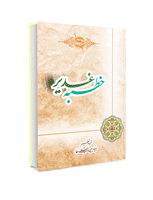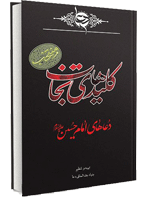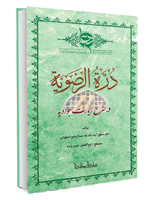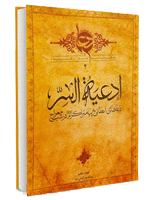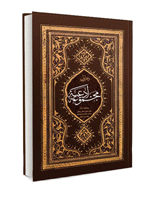- Prophet Muhammad (P.B.U.H&HF): Whenever one of you is needy and brings that to other people, he will not be satisfied. and Whenever someone is needy and brings that to Lord, he shall give him what he wants. sooner or later.
- Imam Sadiq (As.): Whenever you had tenderness in your heart, Pray. because your heart doesn't get tender unless it's pure.
- I told to Imam Baqir (A.S): “What is the meaning of “truly, Ibrahim was awwah and patient”? He replied: “Awwah means (the one who is) praying (to) and wailing (for God) a lot.””
- “Two people, who have acted alike, enter the heaven, but one of them sees the other one in a higher place. Then, he says: O’ Lord! How come has he a superior place in comparison to me while we acted alike? God the Almighty replies: “because he asked Me (whatever he needed) and you did not do that”.
- “The most knowledgeable person to God is the one who asks more from Him”
- “Whoever prays a lot, the angels say: This voice is familiar (to us) and this is the supplication which is accepted and this is the need which is provided”
-
The Holy Prophet (peace be upon him and his Household):
-
وَ لَوْ عَرَفْتُمُ اللَّهَ حَقَّ مَعْرِفَتِهِ لَزَالَتِ الْجِبَالُ بِدُعَائِكُم
If you knew god the way you should’ve known, Mountains definitely will be moved by your supplications. - Crying out of fear of God is the key to his mercy, it’s a sign for his acceptance and it’s a door to answering [supplications]
- Pray to God and believe in his answeres. But understand that God won't accept prays from an unwitting oblivious heart.
Islam And The Destiny of Man
Islam And The Destiny of Man
The advocates of 'determinisim' and the advocates of 'free wall' have argued as fiercely in the Islamic world as elsewhere, and both have found appropriate texts in the Quran and in the hadith literature to support superficially opposite points of view. They have done so despite another report originating with Abu Huraira, who said: 'The Messenger of Allah came to us when we were arguing about [the nature of] Allah's decree. He was angry, and his face became so red that it was as though a pomegranate seed had burst open on his cheeks. He said: "Is this what you were commanded to do, or was it for this that I was sent to you? Your predecessors perished only when they asked about this matter. I warn you, I warn you, not to argue about it!'" Two things are certain, and we must reconcile them as best we can or leave their reconcihation to a greater wisdom. In the first place, the concept of the divine omniscience would be empty if we did not acknowledge that God knows not only all that has ever happened but also all that will ever happen, and that the 'future' is therefore, in a certain sense, already 'past'. In the words of the Bible: 'That which hath been is now; and that which is to be hath already been.' One could not look for a clearer statement of something universally known if not universally understood. Secondly, since as human beings we are subject to time and cannot see the future, we have an experience of free choice which is perfectly valid on its own level and reflects — on this level — the total freedom which is God's alone. We make our choice and act accordingly; only when the act is past and the day is done can we say maktub, 'it was written' - 'it was decreed for us from the beginning of time'. But by then another day has dawned and other choices are to be made, and we do not, if we are Muslim, waste time considering what 'might have been' but could, in fact, never have been. Here, as so often, we have to face the fact that the distinction between believer and unbeliever is a distinction between different universes of thought and of feeling. Told that the 'divine decree' is unalterable, the agnostic — if he is really such — sees himself as a trapped animal caged by a alien and impersonal force. The believer, on the other hand, though exiled from the earthly Paradise, is never exiled from the divine Presence and is no stranger to the One by whose decree he lives and dies. It is said that the Arabic word for 'man', ins is directly related to the word for 'intimacy', uns, and this is one way of indicating his unique privilege of intimacy with the Divine, and at least of hinting at the reciprocity which is at the heart of man's intercourse with God, God's intercourse with man. It is in terms of this reciprocity that we may best understand the nature of prayer and the place which prayer occupies in the life of the Muslim.
Christians who are aware of the master/slave imagery which is central to the Islamic perspective and who see the religion as 'impersonal' compared with their own faith, frequently ask whether the Muslim envisages any kind of personal, reciprocal relationship with his Creator. The Muslim, on the other hand, emphasizes the total self-sufficiency of God and is shocked by the Christian's belief that God in some mysterious way 'needs' man. The difference is real enough but it is also, to some extent, a matter of presentation. For Islam, reciprocity between Creator and creature, with its implication of mutual need, comes about, not on account of some apparent insufficiency in the Godhead, but because the Creator chooses to act in this way. In other words this reciprocity arises from need on our side and from overflowing generosity on His.
The Quranic condemnation of 'forgetfulness' — 'They forgot Allah, so He hath forgotten them' (Q,9.67) - and of 'indifference' (ghaflah) is balanced by constant emphasis upon awareness, expressed sometimes in terms of taqwa translated either as 'fear of God' or as 'consciousness of God', and sometimes in terms of dhikr, a key word in Islam, wiich may be rendered either as 'remembrance' or as 'mention': 'Remember Me, I shall remember you' (Q.2.152). It is in this awareness, this remembrance, this bringing to mind, that 'hearts find rest' (Q. 13.28). Prayer itself is defined as 'remembrance', and indeed all awareness of God is a form of prayer, for to think of Him and keep Him m mind is already to pray to Him; and it is in this way that the outer man and the inner man, hardened by their experience of life in this world, are melted and made receptive — 'Their skins and their hearts soften at the remembrance of Allah' (Q.39.23). Those whose love of the world has carried them out of earshot are lost: 'Then woe to those whose hearts are hardened against the remembrance of Allah' (Q.39.22); and as for him 'who turneth away from the remembrance of Me, his will be a constricted life, and I shall bring him blind to the gathering on the Day of Resurrection' (Q.20.124).
The Quran tells us that mankind was created for one purpose, and that purpose is \vorship\ but it tells us also that this worship evokes an immediate response: 'Call upon Me, and I will answer!' {Q.40.60). There is, therefore, a dialogue in prayer, but man alone is capable of a dialogue with God; the rest of creation 'prays' and 'praises' but does so, as it were, unconsciously, simply by being what it is. The seven heavens and the earth and all that is therein glorify Him, and there is not a [single] thing that does not celebrate His praise; but ye understand not their praise' (Q.17.44). According to a text attributed to Jalaluddin Rumi: 'The darkness of the night and the brightness of the day, the beams of the sun and the light of the moon, the murmuring of the waters and the whispering of the leaves, the stars of the sky and the dust of the earth, the stones of the mountain, the sands of the desert and the waves of the oceans, the animals of water and land praise Thee.' Yet their praise is inarticulate, whereas man has been given the supreme gift of speech, together with the intelligence which makes speech coherent and therefore opens up the possibility of dialogue.
'Man prays and prayer fashions man. The saint has himself become prayer, the meeting-place of earth and heaven; and thus he contains the universe and the universe prays with him. He is everywhere where nature prays, and he prays with and in her; in the peaks which touch the void and eternity, in a flower which scatters itself or in the abandoned song of a bird.'' This is the function of the KhalTfah, the Viceregent; this is what he was made for, and in fulfilling his function he is shaped by it. It is said that the Prophet's grandson Hasan was asked once how it was that people who spent much of the night in prayer looked 'so beautiful'; he explained that it was because 'they have been alone with the All-Merciful, who covers them with light from His Light.' For the human being, at once privileged and yet exposed to the most fearful danger, living is a movement of the perishable and the unstable towards the permanent and the absolute; or else it is a movement towards disintegration. According to al-Ghazzali there are, in the 'invisible' world, 'wonders in relation to which this visible world is seen to be of no account. He who does not ascend to that world ... is but a brute beast, since the beasts are not given the wings with which to take flight thither. Know that the visible is, to the invisible, as the husk to the kernel, as the form and body are to the spirit, as darkness to light... He who is in that world above is with Allah and has the keys of the Unseen,' Here again we meet with a paradox: man as a creature of two worlds or — to put the same thing another way — as a creature with two identities in a single body, the one perishable, the other immortal. It is difficult to conceive of a dialogue between God and His slave; it is far less difficult to conceive of one between God and His chosen Viceregent. It is in the hadith qudsi, those recorded sayings of the Prophet in which God spoke directly through him, that we find the most striking references to the reciprocity which is the basis of dialogue.
M am with [My servant] when he makes mention of me' — or 'when he remembers Me' — 'If he makes mention of Me to himself, I make mention of him to Myself... And if he draws near to Me a hand's span, I draw near to him an arm's length; and if he draws near to Me an arm's length, I draw near to him a fathom's length. And if he comes to Me walking, I go to him speedily.' Here the response to prayer or, indeed, to the simple act of bringing God to mind, is of incomparable magnitude, for the divine presence is obviously greater than any other imaginable gift. As for human supplication, this is not only heard, it is awaited: 'Our Lord who is blessed and exalted descends each night to the lowest heaven, when two-thirds of the night have passed, and asks, "Who supplicates Me that I may answer him ? Who asks of Me that I may give to him? Who begs for My forgiveness so that I may forgive him?"'
Even in this poor world, according to another hadtth 'Allah has angels who travel on the roads seeking those who remember Allah, and when they find people doing this they call to one another, ''Come to what you are seeking!" and surround them with their wings up to the lowest heaven.' Their Lord asks them ('although He is best informed') what these worshippers are saying, and the angels answer that they are glorifying Him, though they have never seen Him; they are asking for Paradise, though they have never seen it; and they are seeking refuge from hell, though they have never seen it. Their Lord then says to His angels: i call you to witness that I have forgiven them!' Not everyone - to say the least — seeks commimion, dialogue with God; most of those who turn towards the heavens in prayer do so from desire or from fear, and those who do so from fear are in search of forgiveness. We are told that God does not greatly care about the motive so long as people do turn to Him and thereby establish the essential link. This is brought out in an astonishing hadith which might have been considered doubtful had it not been recorded by one of the most highly respected of mutahadithun: *By Him in whose hand is my soul, had you not sinned Allah would have removed you and brought a people who sin, then ask for Allah's forgiveness and are forgiven.' According to a hadith qudsi 'Allah has said: O son of Adam, so long as you call upon Me and ask of Me, 1 shall forgive you what you have done and I shall not care. O son of Adam, though your sins reached the clouds in the sky, if you were then to ask for My forgiveness I would forgive you, O son of Adam, were you to come to xMe with sins almost as great as the earth [itself] and then face Me, ascribing to Me no 'partner", I would bring you forgiveness in like measure.' These texts and sayings relate in prayer in general and, perhaps above all, to the dhikr, the 'remembrance', which is the essence of all prayer. But Muslims make a sharp distinction between private or extempore prayer, called dud\ and the ritual prayer which is obligatory five times each day, salah. The effectiveness of the latter does not depend upon individual circumstances, feelings or inclinations. It is a rite, a God-given framework, and so all the human creature has to do is, so to speak, to step into it. It is preceded by the ablution which washes away accumulated grime, by orientation (that is to say, by the worshipper turning to face Mecca), and by the intention to perform such-and-such a prayer or to participate in it. As we have seen, Islam and Christianity interpret the consequences of Adam's 'fall' differently, and islam does not accept that any 'sin' — any 'fair - could determine the inmost essence of the human creature. Man cannot, according to this perspective, lose his theomorphism, his likeness to the divine image, however deeply this likeness may be covered in filth. Not even the most corrosive acid could ever destroy the divine imprint. By means of the ritual ablution this primordial purity, the purity of the creature as he first issued from the hand of God, is temporarily restored and he is made fit to stand upright before his Creator.
Book: Islam And The Destiny of Man - By Charles Le Gai Eeaton


